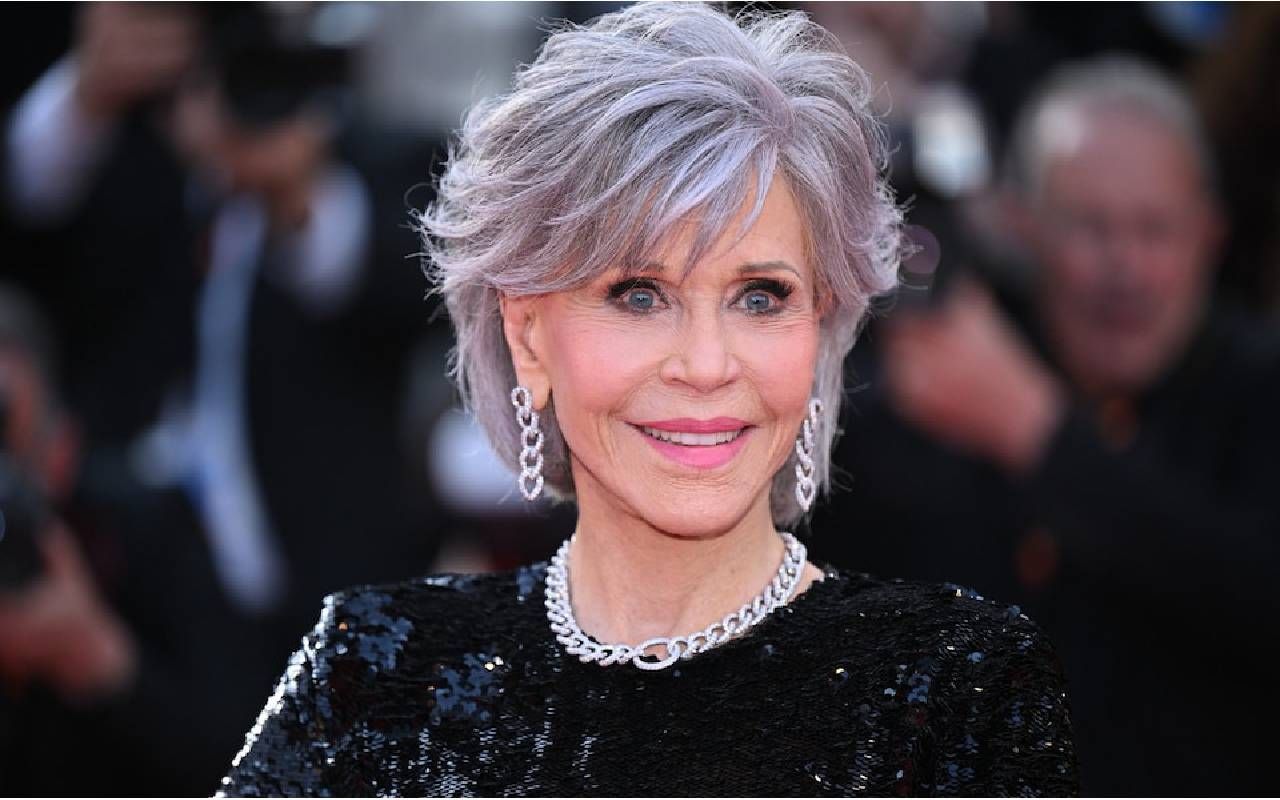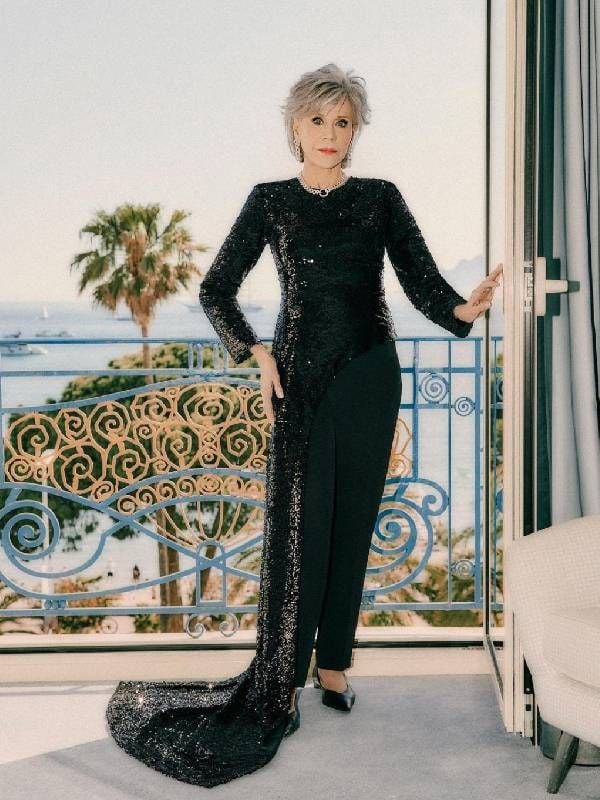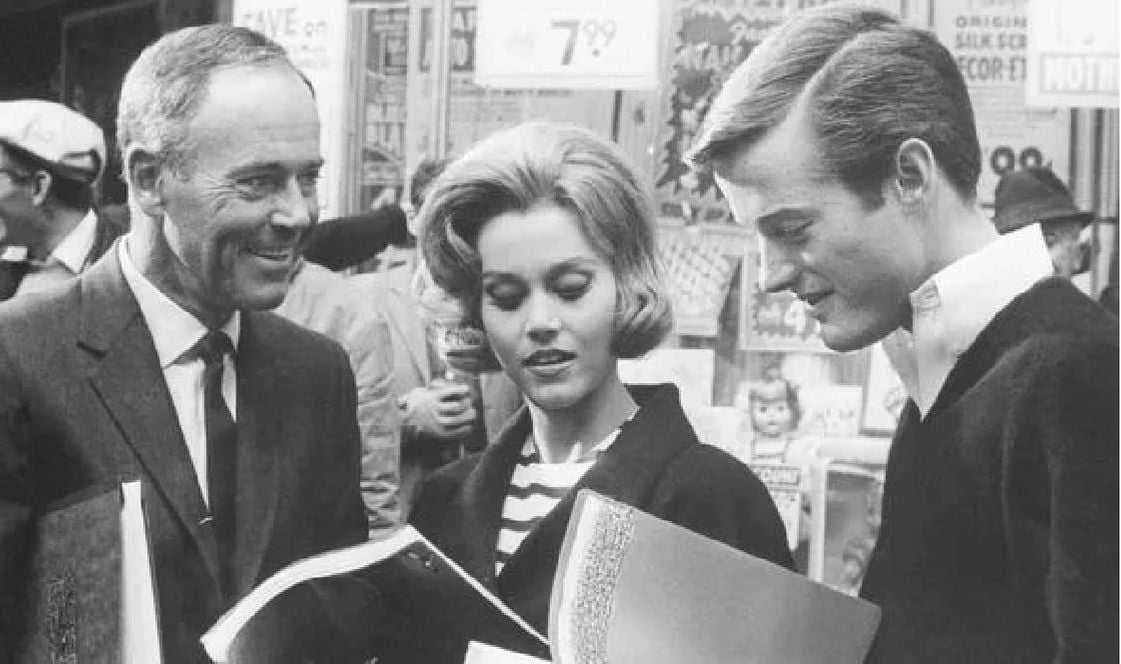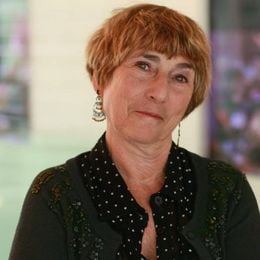A Conversation With Jane Fonda
In an exclusive interview, Jane Fonda talks about climate activism, gray hair, her health, prayer and dating. 'To start a new relationship at 86, are you kidding?'
No one embodies the concept of change and durability in one lifetime like Jane Fonda. She started out as what some might call a "nepo baby," the daughter of Hollywood royalty. Her father Henry's career spanned five decades and in his last film "On Golden Pond," Henry got to work with his daughter, earning him the only Academy Award he ever won for Best Actor.

Jane Fonda was 23 when she took on her first professional role in the Broadway play "There Was a Little Girl" for which she was nominated for a Tony Award for Best Featured Actress in a Play. She continued to receive accolades for her work in films like "Klute" and "Coming Home" which earned her Oscars for Best Actress.
Fonda became as famous for her politics as she did for her acting roles. In 1972, in the midst of the Vietnam War, she visited Hanoi and was famously photographed sitting on an anti-aircraft gun making it look like she would shoot down American planes. That visit earned Fonda the nickname of Hanoi Jane. Today she says of that experience, "I made a mistake while I was there and I regret that."
Fonda's love life has earned her as much attention as her professional career. Her marriages to filmmaker Roger Vadim, political activist Tom Hayden and CNN founder Ted Turner ended in divorce. Fonda says Turner, who once owned the Atlanta Braves, taught her to love baseball. She says he also taught her something important about long-term relationships.
"There's no way we're going to have democracy or equality or end racism or anything if we can't tame the climate crisis."
Fonda says when she and Turner first got together, he told her she'd have to give up her career to be his partner. While trying to balance their competing egos, she and Turner went into couples' therapy. Fonda says she learned "that in a relationship, there are times when one person is the leader and in the spotlight and that person has to be the best possible leader that they can. And there are some times when that person is the follower and they have to be the best possible follower that they can."
Now 86, Fonda has chosen to continue leading by focusing on what she calls the climate crisis. In 2019, she moved to Washington, DC where she led weekly protests in front of the White House in what came to be called Fire Drill Fridays. When she was arrested for civil disobedience, Fonda proudly held up her wrists which were tied with plastic handcuffs. Then she returned to LA to shoot the final season of her Netflix show "Grace and Frankie" in which she co-starred with her longtime friend Lily Tomlin.
In a recent Zoom conversation, I talked to Fonda for an episode of my award-winning podcast, "Now What?" about the friendships that sustain and nourish her, aging, the challenge of coping with illness and what she has learned from a lifetime of acting and activism.
This interview has been edited for length and clarity.
Carole Zimmer: Many people talk, few people act. You are a longtime activist and the work of making things better just seems to energize you. And you've said you're going to devote the rest of your life to working against climate change and that you're having fun doing it. So did you just happen to pick an issue and throw yourself into it? Or is this something that you are much more emotionally connected to?
Jane Fonda: Well, there is no issue as important as the climate crisis because ... and I don't say climate change anymore. It's climate crisis because of the rapidity with which the change is taking place, the inability of almost all the species including us to adapt to the rapidity of the change. The fact that these changes, the extreme weather events, the heating up, the dying off of billions of species, the melting of the ice caps and ice sheets, the rising of sea levels, all of these things exacerbate every single other problem we have, especially inequality. There's no way we're going to have democracy or equality or end racism or anything if we can't tame the climate crisis.
Jane, I was reading something about you talking to a group of women who are in the investing business and you said one thing is never sleep with a guy who invests in fossil fuels.
Yeah, the Greeks had it right. Is it Lysistrata, the play about the women who refused to sleep with the men that were going into war? Remember during the Vietnam war, women say, girls say no to boys who go. So I thought, don't sleep with an oily Democrat or anybody that loves fossil fuels.
The last time that we spoke, I think it was during COVID and you had to stop going to DC where you were doing Fire Drill Fridays in person. You told me at that point that when you moved to Washington, you decided to let your hair go gray. And obviously we don't see a lot of gray-haired actresses in Hollywood. And you said hair epiphanies have always accompanied your life transitions. So how do you feel about the gray hair these days?
Well, I mean, I got lucky. You never know what color your gray is going to be when it comes in, but this is just the way it is. And no, I'm very, very glad. I've saved myself a lot of money and a lot of time and a lot of chemical damage to my scalp.
Also, it kind of puts you up against the aging question, which freaks me out a little bit. But you seem to be doing pretty well with it.
Doesn't freak me out at all. The good old days were not so great for me. I didn't like my earlier years. I'm much better now.
You have said you're a happy 86. That's pretty cool. You wore a red coat that you got from Neiman Marcus on Fire Drill Fridays when you moved to DC to protest the climate crisis. And after the coat, you vowed not to buy any more clothes. For a shopper like myself, this is a very difficult concept. Are you buying clothes?
Not for myself. I get given things. I don't have any more room. I've sold half of what I have. I go to secondhand stores, the repurposing of clothes. That's what I do if I have to. But basically I haven't changed size and I wear the same clothes I wore 30 years ago. So why buy more? Clothes get thrown away and it's not good for the environment, so I just don't do it anymore.
"The good old days were not so great for me. I didn't like my earlier years. I'm much better now."
You're in Hollywood and I guess you're expected to look amazing every time you go on that red carpet.
Well, they loan you clothes, but then they take them back. You're like Cinderella at the end of the party. You take off the jewelry. You take off the clothes and give it back.
I know that Lily Tomlin came with you to a Fire Drill Friday and got arrested and you got arrested yourself several times. And she has said that from the time you were a child, your mantra has been, I can make it better. And that you're so clearly outspoken. It's always well-intentioned. I know she's a good friend of yours. The fact that she supported you in that I'm sure means a lot.
We always go to each other's things. I bring her to Michigan a lot because she comes from Detroit and she gives me street cred because she's a working-class Detroit girl, and she's fought for a one fair wage in Detroit with me.
That is a mark of a good thing in life to have friends like that. So you have embraced getting out of your comfort zone and laying yourself on the line. And I know that you've talked about how you have spent a lot of time catering to your dad, to your three husbands and then you arrived at Jane and you became the center of your own life. And how do you feel about that point in your life?
Well, as women we're trained, we're brought up to be pleasers. We want to be loved. Everybody wants to be loved. But at least a lot of the women I know, including myself, we thought in order to be loved, 'I have to look a certain way. I have to be thin. I have to not be angry. I can't be too ambitious.' That sort of thing is typical of women. And when I finally got to the point where I didn't feel that I had to please the man I was with anymore, then I felt whole, I felt authentic. I was proud of myself. It took a lot of work for me to get there. It took years.

Jane, I was a U.N correspondent at a time when I remember Ted Turner walking into the U.N. for some press conference, and you were there and you were following behind him, and you never said a word. And I really felt like he was the show and that you had somehow decided you would go into the background. Was that the case? Did you stop your career?
Yeah, it bothered me a lot in the beginning. I was used to being the one up on the stage and everything. And it bothered me also because he didn't prepare very much, although he sometimes was totally brilliant. But we went to couples' therapy because of it, among other things. And what I learned there, I think was a really interesting thing. I learned that in a relationship, there are times when one person is the leader and in the spotlight, and that person has to be the best possible leader that they can, and there are some times when that person is the follower and they have to be the best possible follower that they can.
And Ted sometimes was the follower, and he was okay. He had humor about it. I remember we were in Moscow when we had a meeting with Gorbachev and the three of us were sitting on a couch and Gorbachev was in the middle. And he spent the whole time with his back to Ted talking to me. And afterwards, I didn't even know to think about it, but Ted noticed it. But he was sweet and generous about it. So probably that time that you saw me at the U.N., it was his turn to be the leader and not mine and I had learned to behave myself.
"Now, when things go bad, I can weather them. Been there, done that. That's something that you tend to gain when you're older."
You've never learned how to behave yourself. Come on, Jane.
Yes, I have. I spent 20 years in Georgia.
Oh yeah, where you did a lot of work with teenage girls, teenage mothers.
Boys as well, not just women. It takes two, girls and boys, helping them feel empowered, helping them take advantage of the opportunities that come in their life, which you can't do if you're a child with a child.
We talked a little bit about gray hair and in Hollywood, being old isn't something that a woman really wants to be but you've had a bunch of movies out recently, "80 for Brady," "Moving On" with Lily Tomlin, "Book Club Two." How is it different for you now than it was for you making movies like "Barbarella" with your former husband Roger Vadim?
Now, when things go bad, I can weather them. Been there, done that. That's something that you tend to gain when you're older. You've been through it before and it didn't kill you, so this'll be okay, I'll get through it. You can have more sense of humor about things. Don't get stressed so much. Things are just easier in some ways.
I try to ask myself, why are you stressed about that? It's not a life and death situation. It's just a thing that happened on Tuesday. Just get over it, calm down. And maybe I'm getting better with age, too.
Most people tend to get better with age, especially women. In fact, I wrote a book about aging called "Prime Time," and I did a lot of research and I discovered that important longitudinal studies have been done. Hundreds of thousands of people married, unmarried, all races, men, women. And what was found by the gerontologist and scientists was that after 50, most people have a greater sense of well-being, are more able to see things from others' points of view, don't tend to make mountains out of molehills. Again, when you're older, so much depends on health. You see, I mean, I've had cancer, but it's in remission. I've had joints replaced. But basically, I'm healthy. I'm 10 years older than my father was when he died. And he seems so old because he was sick. He had heart disease. Well, I'm healthy, so successful old age depends on health.
And just because you're old doesn't mean you're not healthy.

No, but when you got that cancer, I think it was diagnosed as non-Hodgkin's lymphoma?
Non B cell non-Hodgkin's lymphoma.
Yeah, in 2022, did you freak out? Did you feel 'why me?' Like, oh my God, I'm going to die. Or how did you react?
Why me seems such a ridiculous thing to think of. I mean, come on. The people who suffered in the world, why me? Why not me? I can afford to die. No, I'm not afraid of dying. And I knew I've had this lymphoma, but it was inactive for a long time. So I knew when I was in Italy and feeling not very well, and that I was pretty sure that the cancer had become active and I was right, it had. So, I don't know, it's like I'm ready to die if that's what happens. I'm ready to live if I have the chance and grateful for that. But no, I didn't even cry. No, I just said, okay, what do we do?
"So, I don't know, it's like I'm ready to die if that's what happens. I'm ready to live if I have the chance and grateful for that."
And what you did was —
Look, I have good health care. I can afford it, good insurance. So, I'm at an advantage. And I guess if you're not so sure about what kind of insurance you have, it's going to be a scary thing, but death does not scare me.
I wanted to go back to talking about women. America Ferrera had the role of Gloria in the "Barbie" movie, which became such an unbelievable success. And she gives a speech to Barbie about the impossible double standards of being a woman. She said, "You have to never get old, never be rude, never show off, never be selfish, never fall down, never show fear and never get out of line." I think it just kind of still reverberates today. The Women's Liberation Movement happened such a long time ago. Do you think we are still there in the same place?
No, we're not in the same place. Everything depends on how your parents treated you when you were little. If they made you feel that you had to be... Like for me, if I wasn't thin, I was not going to be loved. If I didn't look a certain way, they were not going to love me. If that's what you grew up (with), the message that you received, it's going to impact you. And then you're going to have to work hard to get over it. And that's where the women's movement comes in. It helps you realize they're wrong, screw them. I'm just fine. I don't have to be this way and that way and the other. But you have to work at it, and the women's movement helps you work at it but it doesn't prevent you from feeling a certain way if that's how you were raised.
So you now say, after being married three times, that you are no longer interested in romance or sex and you don't have the time for it, and that you're not lonely and that you're so glad to live alone and do whatever you want. Is that the Jane I'm talking to?
Yeah. That's the Jane. I like to quote from the Vagina Monologues, 'closed shop due to flooding.' It's called Flooding and it's one of my favorite monologues. Anyway, yeah, no, look at my age, unless you've grown up with somebody and they've grown old with you and you've spent a long time together, I envy them. I wish that I'd had that. But to start a new relationship at 86, are you kidding? I mean, some do, but I wouldn't want to. I am busier than I've ever been in my life, and there is no room for a relationship. And I'm very happy about that.
"Look at my age, unless you've grown up with somebody and they've grown old with you and you've spent a long time together, I envy them. I wish that I'd had that."
Well, you've also said if you were to take a lover, he'd have to be 20.
That's another reason that I'm alone is because I like young men and I'm 86 so that's not going to work. And I'm not proud of that. But if you've grown old with somebody, it's one thing. But for me, I would not be able to get in bed with a guy whose flesh hung off his bones like mine does. You're not going to get naked with me, no.
You mentioned your favorite passage from the "Vagina Monologues." And I have to tell you that V, who's the author of the "Vagina Monologues," formerly known as Eve Ensler, she had uterine cancer, and she almost died. And she told me that one day when she was in the hospital, after she had had this extensive surgery, she opened her eyes and who was standing at the foot of her bed, but you, and that meant so much to her and just showing up for your friends. I mean, I guess that is one of the great joys in life really.
Well, she did that for me. I had my first hip replacement, and I was in terrible pain coming out of the anesthetic, and I felt something in my feet, and it was Eve massaging my feet. She traveled down to Atlanta from New York to massage my feet. That's what friends are for. That's a good friend.
You have also said that you didn't have much parenting, so it's really your women friends that have taught you how to be. You also have young women friends. I love that in my own life because it's such a wonderful mix of energy and people being at different points in their life and it makes for great friendships, I think.
Also, when you die, you want to have somebody hanging around that loves you, if they all die before you.
So, we talked about the cancer. You had chemo. You got through the chemo. Was it rough?
I remember the first one. I had the first one, and the next day I did a workout and I started doing push-ups. I could only do two. I thought, okay, that's how it affected me. I lost my strength, and the second one and third one, it was kind of the same, not so bad. Maybe two days of tired and then traveling, I was fine, but the fourth one knocked me back. It was really hard to get over that. It was difficult. And then they told me, I don't have to have any more because I was in remission, so that was good.
So it was just four actually. I mean, there are people who go for a long, long time. That's got to be really tough.
And there's different chemos, I realize. For what I had, there was one kind, I've had breast cancer, but I didn't have chemo. Everything is different, and they've made so many advances. What they don't do though is try to prevent cancer. That's what gets me. A lot of it is caused by fossil fuels. One out of five people in the world who die every year die because of fossil fuel related air pollution, one out of five. I mean, cancer has become epidemic, and it's because of fossil fuels and petrochemicals, and they're not doing anything about it.
Well, hopefully, if we actually ever do get to tackling this climate crisis, it'd be interesting to see what diseases kind of —
Cancer, heart disease, asthma, nosebleeds, these kinds of things would decline rapidly.
I mean, let's hope we go there, Jane. Let's hope we do.
Let's stop hoping and let's start taking action. Hope won't get us a cup of coffee.
"I know I can't make my life longer but I can make it wider and deeper. And that's what I have been determined to do."
Are you religious? Do you consider yourself religious, and is that something that you think about as you get older?
Oh yeah, I certainly think about it. When I lived in Georgia for 20 years, everyone went to church all the time and sometimes twice a week. And they grew up that way. And so I enrolled in the Interdenominational Theological Seminary, and I was the only white person. It's where they trained Black ministers. And I studied the Bible, and I've studied quite a bit, yeah.
And now?
I'm very interested in the historical Jesus for example. I've read all the Gnostic Gospels as well.
And do you go to church?
No, I pray. I don't go to church.
And do you feel like prayer really has —
Power? Yes, I do. Prayer and meditation, just answering questions, feeling not alone, feeling connected to everything, including nature, respect for nature. All these things come to you with prayer and meditation.
When you were 59 you said that you wanted an intentional life, that that was something you would focus on. Do you feel like you are doing that?
One of the things that I've learned over the years is it's not having had lots of experiences that makes you wise. It's understanding the meaning of those experiences in your life. And I've spent a lot of time trying to understand the meaning of my experiences. And I think it has given me a certain wisdom. I know I can't make my life longer but I can make it wider and deeper. And that's what I have been determined to do.


